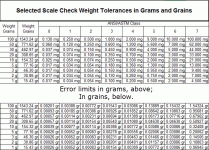Aguila Blanca
Staff
Every time you use the check weight to calibrate your scale, you are introducing a scientifically-troublesome degree of inaccuracy:
https://www.scientificamerican.com/article/redefining-the-kilogram/
[Yes, this is mentioned in some degree of jest.]
https://www.scientificamerican.com/article/redefining-the-kilogram/
[Yes, this is mentioned in some degree of jest.]

